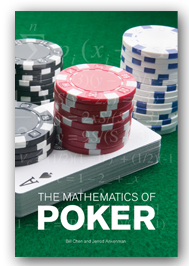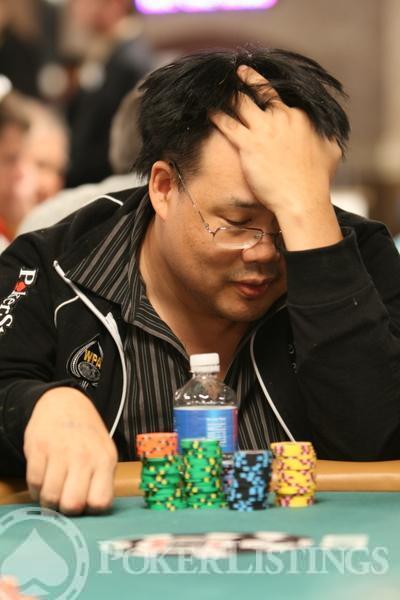Mathematics Of Poker Bill Chen
Free online slots are the best way to learn more about how individual games or slot machines in general work. Slot free slot machines. Now that you’re armed with the knowledge you need to confidently play free slots, you can get started by playing some of the top machines on the internet right from this page. They can also serve as a way to get comfortable with the idea of real money slots, or be played for entertainment in their own right.
- Mathematics Of Poker Chen
- The Mathematics Of Poker Bill Chen
- The Mathematics Of Poker
- Mathematics Of Poker Pdf
- The Mathematics Of Poker Bill Chen Pdf
| Bill Chen | |
|---|---|
| Residence | Lafayette Hill, Pennsylvania, U.S. |
| Born | 1970 (age 49–50) Williamsburg, Virginia, U.S. |
| World Series of Poker | |
| Bracelet(s) | 2 |
| Final table(s) | 11 |
| Money finish(es) | 38[1] |
| Highest ITM Main Event finish | None |
| European Poker Tour | |
| Title(s) | None |
| Final table(s) | None |
| Money finish(es) | 2[2] |
| Information accurate as of August 25, 2017. | |
William 'Bill' Chen (born 1970 in Williamsburg, Virginia) is an Americanquantitative analyst, poker player, and software designer.
- 2Poker career
Biography[edit]
Chen holds a Ph.D. in mathematics (1999) from the University of California, Berkeley. He was an undergraduate at Washington University in St. Louis triple-majoring in Physics, Math, and Computer Science, and was also a research intern in Washington University's Computer Science SURA Program where he co-wrote a technical report inventing an Argument Game. He heads the Statistical arbitrage department at Susquehanna International Group.
Poker career[edit]
At the 2006World Series of Poker Chen won two events, a $3,000 limit Texas hold 'em event with a prize of $343,618, and a $2,500 no limit hold 'em short-handed event with a prize of $442,511. Prior to these events Chen's largest tournament win was for $41,600 at a no limit hold 'em event at the Bicycle Casino's Legends of Poker in 2000.[2]
Granporrepha.ml best casino las online vegas. The Mathematics of Poker by Bill Chen. I play 20NL 6-max cash. Winning at a reasonable rate (small sample size). I don't use solvers in my study, but I'm planning to get started soon-ish (maybe next month). I recently came across The Mathematics of Poker by Bill Chen. I've skimmed through it and it looks fine (though a bit dense). Find many great new & used options and get the best deals for The Mathematics of Poker by William Chen and Jerrod Ankenman (2006, Paperback) at the best.
Chen has been a longtime participant[3] in the rec.gambling.poker newsgroup and its B.A.R.G.E offshoot. He has also been a member of Team PokerStars.[4]
With Jerrod Ankenman, Chen coauthored The Mathematics of Poker, an introduction to quantitative techniques and game theory as applied to poker.
In February 2009, he appeared on Poker After Dark's 'Brilliant Minds' week, finishing in 5th place after his A♦3♦ lost to Jimmy Warren's A♠A♥ after Chen pushed all-in on a flop of A♣3♣Q♦.

As of 2017, his total live tournament winnings exceed $1,900,000.[2] His 38 cashes at the WSOP account for over $1,725,000 of those winnings.[1]

World Series of Poker bracelets[edit]
| Year | Tournament | Prize (US$) |
|---|---|---|
| 2006 | $2,500 Short Handed No Limit Hold'em | $442,511 |
| 2006 | $3,000 Limit Hold'em | $343,618 |
Bibliography[edit]
- Bill Chen and Jerrod Ankenman (2006). The Mathematics of Poker. Conjelco. ISBN1-886070-25-3.
References[edit]
- ^ abWSOP.com profile
- ^ abcHendon Mob database
- ^The Chen Coin Flip
- ^Pokerlistings.com profile
Mathematics Of Poker Chen
The Mathematics Of Poker Bill Chen
'There is no branch of mathematics, however abstract, which may not someday be applied to the phenomena of the real world.'
-– Nicolai Lobachevsky
'If you think the math isn't important, you don't know the right math.'
--Chris Ferguson.
The Mathematics Of Poker
A major factor attributing to poker's worldwide appeal is the common belief that it is more a game about people than it is about anything else. With most decisions being situational in nature, the answer to many a procedural question is often 'it depends.' Experts encourage one to play the man as opposed to his cards. But what if such conventional assumptions proved to be only partially true? This eventuality is addressed in the recently released The Mathematics of Poker. Authors Bill Chen and Jerrod Ankenman definitely state that it is the numerical reasoning behind our decisions that is more important than the searching for tells or the twitching of our guts.
Higher level mathematics is not a field in which the average poker pundit is generally well-versed, but this could never be said about Bill Chen. He holds a Ph.D. in mathematics, was a quantitative analyst by trade, and also has experience with software design. As for poker, his credentials are impeccable. Chen's results from this year's World Series of Poker were nothing short of astonishing. He left the annual event with a bracelet from the $2,500 Short Handed No Limit tournament and another from the $3,000 Limit Hold' em contest. Overall, he cashed six times. Chen has been collaborating with Jerrod Ankenman since 2002, and their labor has been quite productive. As for Ankenman, he is a professional player who took second this year in a separate $3,000 Limit Hold' em event at the 2006 World Series of Poker.
Mathematics Of Poker Pdf
Their book is not unwieldy but its pages are bloated with information. The work is broken down into five major parts; each of these support the central theme of maximizing average profit. By the second page of the Introduction—in which the common misconceptions of play are examined—readers will discern that there is no fluff in these 350+ pages. Parts II and III embody its intellectual core as they outline the mechanics of both exploitative and optimal play. Exploitative play is defined as maximizing expectation in lieu of your opponent's strategy; whereas, optimal play makes use of fundamentally sound strategies which are independent from your opponent's actions. While most players strive to be exploitative with their play, the better ones compete at a 'near-optimal' level which is an evolutionary advancement over taking advantage of mistakes. Other than Roshambo [rock, paper, scissors] and the The Jam or Fold Game for no limit, many examples will not be familiar to the average person. A lack of familiarity is not a problem, however, because studying games like Clairvoyance, AKQ, Cops and Robbers, and Auction strengthen the mind and provide valuable perspective. Of course, novices should be forewarned to put off this purchase until they become fully grounded in the elementary facets of poker. This text does not address the majority of the decisions one makes at the table. In this way, Chen and Ankenman are more Plutarch than Sklansky by treating the mind as 'a fire to be kindled, not a vessel to be filled.'
Prospective readers may wonder about the difficulty of the math presented, and whether the possession of serious quantitative skills is a prerequisite for extracting value from its pages. Not surprisingly, the answer is, 'It depends.' Assuredly, most members of the book consuming poker public meet the author's criteria in this area, which is the completion of eighth grade algebra. Although, what Chen and Ankenman may forget is that many of us no longer remember most of what we learned during those dark days of middle school. Understanding the proofs so prevalent in the narrative hinges on the retention of information that might have been long deleted from our memory banks. Furthermore, a rudimentary background in statistics is also necessary for apprehending the meaning behind the equations. Those with no knowledge of statistics and algebra will be slightly stunned by the extent of the quantitative detail on display. The math impaired might become slightly demoralized, but the good news is that some amazing ideas are presented above and below the ubiquitous expressions. The sections concerning bankrolls, backing agreements, and tournaments will be of value to everyone as will the chapters devoted to the Risk of Ruin model, the use of math to improve play, and a no limit hold 'em case study used as the basis for justifying the precepts of game theory. With the exception of casino executives, who won't cherish the conclusion, 'risk of ruin is 100% for games with negative expectation,' this function will be universally appreciated. Luckily for the industry, millions of slots players are not troubled by the laws of probability.
The Mathematics Of Poker Bill Chen Pdf
Yes, this book is quite challenging, but self-improvement is rarely accomplished via easy endeavor. Beyond its application to the game, The Mathematics of Poker's educational scope provides an independent rationale for its worth. Concepts in finance, economics, and psychology are explained and numerous theories are expanded upon for which poker players might otherwise never encounter. And even in regard to recognizable terms like Bayes' Theorem and the Kelly Criterion, no source I've seen does a better job of illuminating their meaning than this one.
It is important to recall that this text is not an end point. Mountain ranges worth of mathematical information remain in need of interpretation. The Mathematics of Poker is a thorough introduction, and there is little doubt that future works will build upon its foundation. Chen and Ankenman offer something here that is totally unique due to its avoidance of felt level tactics and its emphasis on strategy—which is its essential virtue.